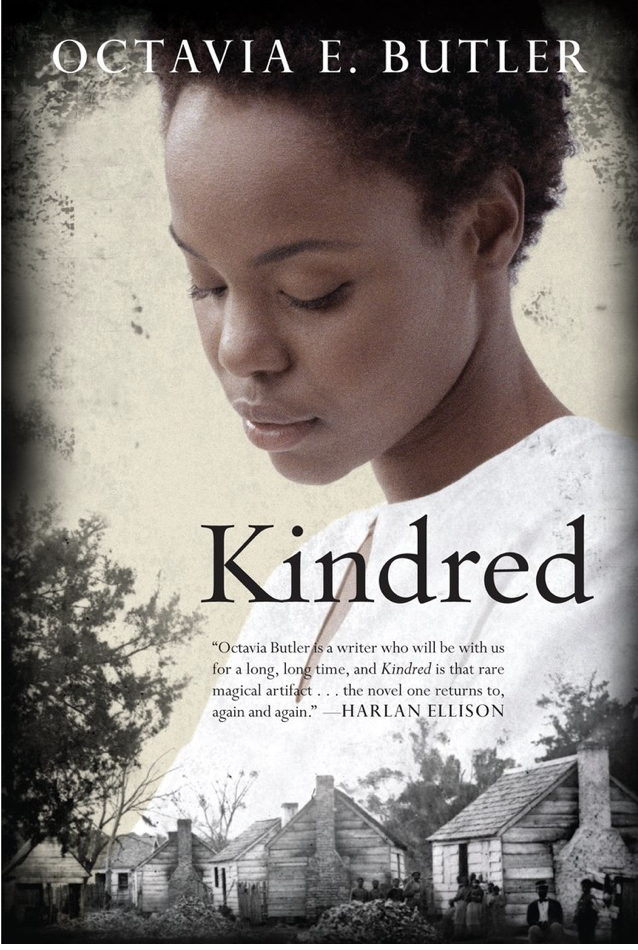For the Love of Literature
A Butler Past
BY KHADIJA POUNSEL
Springtime: daffodils, tulips and morning glories open softly and the rains are gentle. Families of robins and cardinal couples reappear. My favorite season’s blooming beauty and vibe of fresh newness infuses my quarterly check-in with a kind self-support. Reminded of my goal to explore two genres: graphic novels and Afro-futuristic literature, I begin researching the latter. The name called in article after article is a familiar one: Octavia Butler. While her titles like Parable of the Sower, Parable of the Talents and Kindred are familiar to me, as a younger woman I associated them with science fiction, which I must admit kept me from exploring them.
But it is a new era, a new year and a new resolution, so I think, “I will read Parable of the Sower first;” but I keep seeing that her most popular book is actually Kindred, so I select it instead. When I read the book’s description, it mentions time travel, but not to the future as I expect given the genre, but to the past. The antebellum past. I hesitate, take a deep breath. “Give it a try,” I whisper to myself. Plus, I can read Kindred with the Spring issue of KIZA Black Lit’s theme of social roles, including familial ones, in mind. Surely, given the title, Kindred will lend itself easily.
Wanting to make sure that I am clear on the precise meaning of the word, I turn to Merriam-Webster Dictionary.
Kindred (adj): 1) of a similar nature or character, 2) of the same ancestry
(noun): 1a) a group of related individuals, 1b) one’s relatives, 2) a family relationship
Then I begin. Startlingly more graphic than I expect, by the time I am sixty pages in, I have been introduced to the main character, Dana, to her husband, and it is clear that Dana’s present-day social roles and familial relationships are set. Yet the social roles and familial relationships that she discovers (including her own) in her time travel to the past—well, they are unfolding.
Because I do not want to spoil it for those who will read the novel, I will not go into much detail regarding the social and familial roles covered in it; but I will touch on three points that I gleaned. First, Kindred explores through Dana’s time travel the formation of various families, including her own, and more specifically the everyday circumstances—both pleasant and horrific—that serve as the motivation, boundaries and meaning of such connections. Early on in her time travel, Dana wonders where she is and feels relieved upon receiving a clue. My first take-away: social roles (and families) are rooted in and are the product, in part, of place. The “where” is important.
Second, Kindred allows Dana (and the reader) the advantage of seeing how specific events, some seemingly casual and others obviously consequential in the lives of her upline and those socially connected to them, could create or destroy future possibilities. If Dana’s identity is kept hidden, will it matter? My next take-away: social roles (and families) are not stationary but dynamic, shaping the ethos of a society and its families. It’s all in the details.
Finally, Kindred presents through Dana’s time travel social expectations that determine, in part, the behavior of the major and minor characters in the novel. Dana says to her husband, “Let me help you with Rufus. Let’s see what we can do to keep him from growing up into a red-haired version of his father” (page 81). My third take-away: social roles (and families) are controlled, in part, by the norms of the groups they are in proximity to, in addition to norms of their own. Influence, whether deliberate or recognized, is often at work.
The story of Kindred: Dana is problematically sympathetic, for my taste, to the central character from her time travel, Rufus. It frustrates me the entire read, but that is a discussion for another day. In spite of that frustration, I am looking forward to reading Parable of the Sower and Parable of the Talents. I have read a Butler past, so I am curious to read Butler futures. Buoyed up by Spring’s sweetness, I would like to get a roll going. Wish me luck.
Loving literature,
Khadija Pounsel

